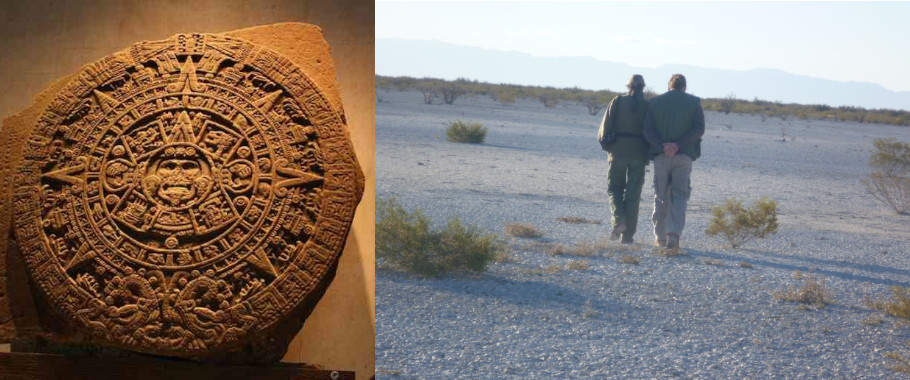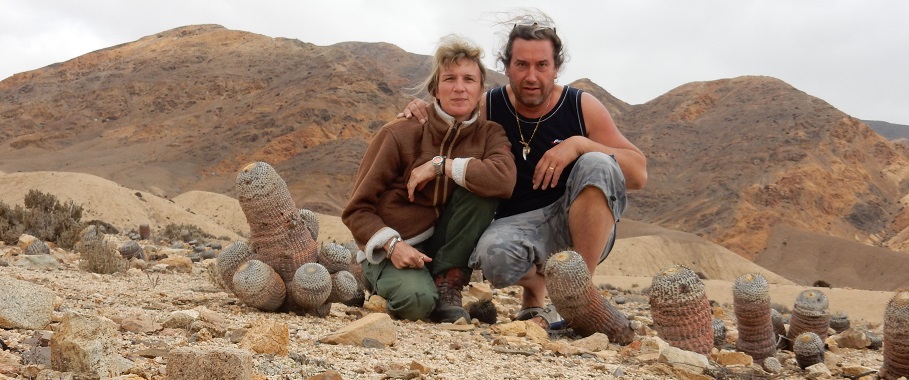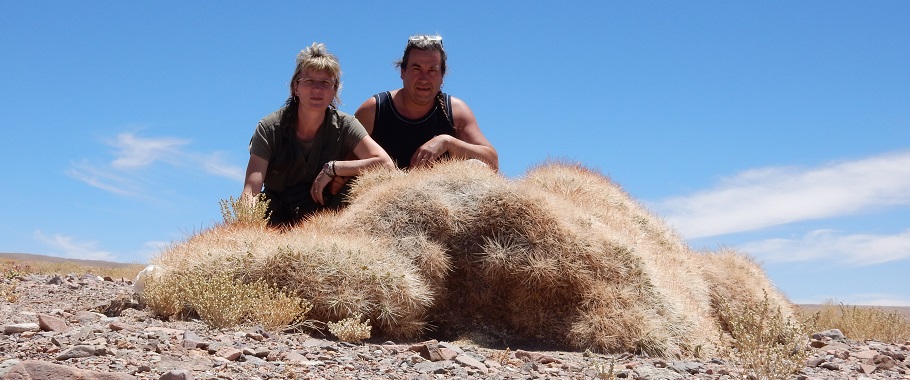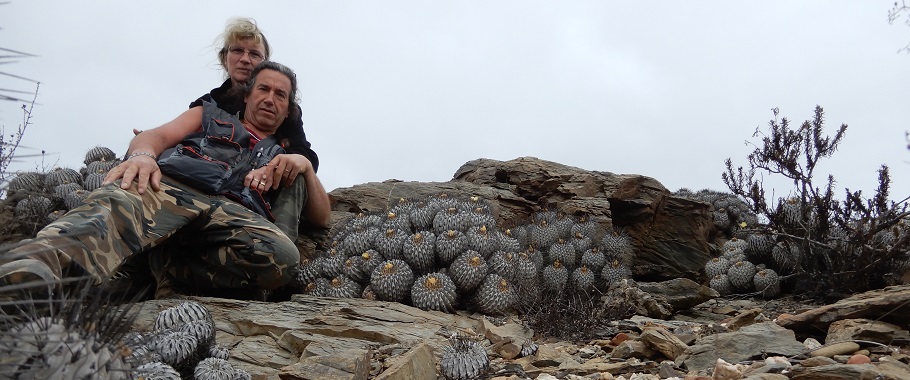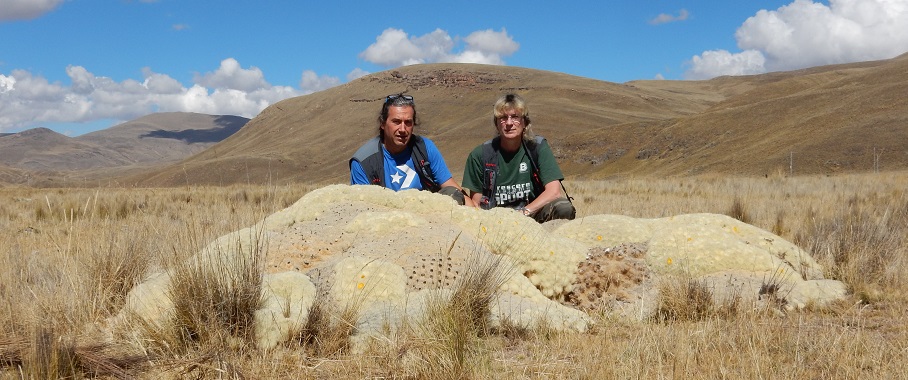- Details
- Category: I Nostri Viaggi
- Published: Friday, 25 July 2014 20:52
- Written by Elvia
- Hits: 2474
 Second time in Baja California.
Second time in Baja California.
In 2012, it was a short trip, 16-day with flight and we took care only of Fouquierie. This time we're going to try everything else ...
Comes with our friend Cedric, a great lover of Ferocactus, right trip for him.
 Before the beach ... beach ... Before The flight is on time. We arrived at 6 in the morning in Mexico City, hurry the formalities of ritual and go to the Hertz rental car. Leaving the city, we take the highway to Mazatlan (Sinaloa) through cultivated plains and, endless in the evening, around 19 we found the hotel for the night, after traveling more than 1,000 km.
Before the beach ... beach ... Before The flight is on time. We arrived at 6 in the morning in Mexico City, hurry the formalities of ritual and go to the Hertz rental car. Leaving the city, we take the highway to Mazatlan (Sinaloa) through cultivated plains and, endless in the evening, around 19 we found the hotel for the night, after traveling more than 1,000 km.
The next morning we go to the harbor for tickets to La Paz, we reach Topolombambo and, in the evening, boarding for the Baja ...


After landing, we are separated: Cedric and I sent down to feet, to passport control and search (I ask because having been controlled landing in Mexico the day before). The explanation: see if we have pending legal proceedings in Italy! A Moreno gets worse: more than two hours for the search of the car and bags and must pay a fee for landing. Things to freak out ... 
The long peninsula, 1300 km, is divided into two states: Baja California Sur (BCS) and Baja California Norte (BCN). Vacation spot for many Americans, it is a very different territory from Mexico classic: clean, utmost kindness towards tourists, good hotels and restaurants, in some areas very expensive. Not being densely populated, its countries are quite far from each other. There is only one road that runs through it all: the Mex 1.
It does not have areas that are too challenging for seekers of cactus, certainly is the home of Ferocactus and Mammillarias, mainly hooked.
It was first conquered land (in past centuries) in search of gold, which was not there. In a second step, the Jesuits thought that there were many Indians to convert, also built several missions (many completely abandoned now). When smallpox and syphilis, brought from Europe, decimated the population, abandoned to their fate this earth.
To the west is the Pacific Ocean, to the east and the Gulf of California or Sea of Cortez: a paradise for anglers.
The tranquility disappears near the border with the United States. Tijuana is notorious, such as Ciudad Juárez, Chihuahua, to the high rate of crime: this happens in spite of many tourists come there, being a free port, and all goods are sold at very low prices.
We can start the tour.


 We start from La Paz destination Cabo San Lucas with various stops along the Sierra La Laguna. For our needs, Cabo San Lucas is a strong tourist town, with too many buildings, too many people and chaos ... there are not places we prefer. We decide that by the evening, we come to Todos Santos, a small town smaller and quieter.
We start from La Paz destination Cabo San Lucas with various stops along the Sierra La Laguna. For our needs, Cabo San Lucas is a strong tourist town, with too many buildings, too many people and chaos ... there are not places we prefer. We decide that by the evening, we come to Todos Santos, a small town smaller and quieter.
For the next day, the destination is Puerto San Carlos, where they live Machaerocereus eruca.

Arrived, we rented a boat to visit two islands in front of: Magdalena and Santa Margarita.

The year before, in March, we saw gray whales with puppies, but this time in the fall season is not sin ... ! Let's see the plants. In the evening our tent by the sea with a sunset postcard.
Although we are at the end of October, there is still a lot of tall grass which makes it difficult to sightings of smaller plants.
Going along the peninsula, the Mex1 moves toward the Sea of Cortez and arrive at Loreto, where we stop to go to the island of Carmen. Because the island is a park, you have to pay a ticket for the landing and visit it. In return Moreno can fish and dolphins are to keep us company.

It starts going through Mulege, Santa Rosalia and arrive at the Mission S.Ignacio, well restored and preserved.
At Guerrero Negro there is the border between South and North, with its military control; shortly after you enter without a doubt the most spectacular for fans of cactus: the valley of Los Cirios (local name for the Fouquieria columnaris)
 For the evening, the Bahia Los Angeles awaits us. We prepare the tent on the beach and we look to find a boat that will take us the next day to the island Angel de la Guarda. The weather is not good, and if it stays like this, you do not go to sea; in most of us shoot crazy amounts for hire ... the next morning the weather is bad, so again towards the North.
For the evening, the Bahia Los Angeles awaits us. We prepare the tent on the beach and we look to find a boat that will take us the next day to the island Angel de la Guarda. The weather is not good, and if it stays like this, you do not go to sea; in most of us shoot crazy amounts for hire ... the next morning the weather is bad, so again towards the North.
 The road from El Rosario to Ensenada is very ugly, full of work in progress and military controls. Cross country battered, dirty, from despair. The plants encountered along the peninsula are many, especially (as mentioned above) Ferocactus and Mammillarias: not to bore you with a rather lengthy list, we recommend you look at the photo gallery, there are all varieties encountered but many ...
The road from El Rosario to Ensenada is very ugly, full of work in progress and military controls. Cross country battered, dirty, from despair. The plants encountered along the peninsula are many, especially (as mentioned above) Ferocactus and Mammillarias: not to bore you with a rather lengthy list, we recommend you look at the photo gallery, there are all varieties encountered but many ...
From the West back to the East recrossing the peninsula, we climb up to S.Luis Rio Colorado.
From here to Sonoyta for a long stretch runs along the border with the United States and you see the wall that separates the two states.
Fortunately, the landscape changes considerably when you enter the area of the Desierto de Altar. Dark mountains on the horizon are placed on endless white plains, almost a lunar landscape and finally ... the Saguari! Moreover, for the first time, we meet the Echinocactus polycephalus. 

 The latter are found where there are dark rocks; On the season, are also found in the high grass dry. Unfortunately, we see that there are small plants, only specimens of good size, which means that in recent years the weather conditions were not good for their germination, this endangers the species in this area.
The latter are found where there are dark rocks; On the season, are also found in the high grass dry. Unfortunately, we see that there are small plants, only specimens of good size, which means that in recent years the weather conditions were not good for their germination, this endangers the species in this area.
The last stop is here in the north of the island of Tiburon so we deviate from Hermosillo to Bahia Kino: a country virtually on sale. Everywhere signs of selling homes. Let's go to Punta Chueca; Indian Village is a true place of despair. For them, the island of Tiburon is a sacred place, where they buried the dead, and are not willing to join us there: we have to go back.
Back in Bahia Kino find a boat for the next day early in the morning and reach the island where, looking plants, we also encounter a long rattlesnake!
The ride to the north is practically finished, cross the Sierra Madre Occidental in torrential rain which requires the utmost attention .. Moreno curves, curves and more curves, with lots of rocks to avoid fallen on the ground. Another 4 days with various stages of Durango, Coahuila, Nuevo Leon and San Luis Potosi ... To get to the final act of this trip: groped to find the Strombocactus corregidorae described some years ago in the Municipality of S.Joaquin, Queretaro.

..and this has been a really great day!
In the morning the weather was not good, was threatening rain.
More than 3 hours of paved road that climbs the mountains through the woods and suddenly ends up becoming a track traced to make the aqueduct and then is left to his fate, a real disaster. We logically with a normal car and not a 4x4. The few people we met said it was not feasible to continue with that kind of car, it was dangerous and if it started to rain "strongly advised" to go back in a hurry because everything caved ... but we decided in any case to try. We come to a crossroads and had to choose whether to go up to the mountain tops or down to the Rio Moctezuma. We decide to go and the problems begin. The guardian of the aqueduct asks us if we have your permission: we fall from the clouds, no one told us anything, there are no signs ... maybe because not many people come here. We explain that we just want to photograph plants, water supply and if we do not care nothing can make us the pleasure of watching leave the area. Gives us half an hour. We are a long ridge overlooking into nothing, 3-400 meters below us. jump, the ground is not good for Strombocactus and even the altitude (over 2,000 meters). So we go back, we salute the guard and go down to the river.
We stopped the car of Medioambiente (the Mexican forest), the guard gives us a reproof (in part rightly) for more than half an hour of the series: do you have permission? foreigners come here to collect plants, it is time to stop, etc.etc ... and finally ... but where are you going to go with that car ????
When they finally let me speak I explain what are our intentions, we know the law, we have the utmost respect for fauna and flora, we just want to take pictures and if you want you can come with us to see how we behave, what we must do for permission, but if you do not want, we go back. At the end he is convinced of our good intentions and gives us permission and 3 hours to visit the area, but if it starts raining we must go back immediately because the dirt would become too dangerous. For all the time we would always have the feeling of being watched. We get to the river, the land is good, there are various types of cactus but even the shadow of Strombocactus. We go to different ridges until, seeing that the time granted was ending, we decided to go back. We are already coming to the car when looking around I see a good ledge  and I say to men: let's try that again to finish. Moreno is ahead, and when we are on the precipice, moving carefully so as not to fall, I ask him if he sees something ... the answer is: there are plants, but can not figure out what kind.
and I say to men: let's try that again to finish. Moreno is ahead, and when we are on the precipice, moving carefully so as not to fall, I ask him if he sees something ... the answer is: there are plants, but can not figure out what kind.
I get near and finally the Strombocactus corregidorae that adults no resemblance to other varieties of the Family. We photograph a lot and then the rain begins to fall hard: running back into the vehicle to move away in a hurry with the road is becoming a quagmire tremendous. We cross a stream and finally get back to the country where the paved road. We can return calmly to Cadereyta for the evening and drink a toast to our adventure .... last thought: we hope to Cedric enjoyed this journey into the land of cactus and may be others together.
TO VIEW THE PHOTO GALLERY CLICK HERE:

